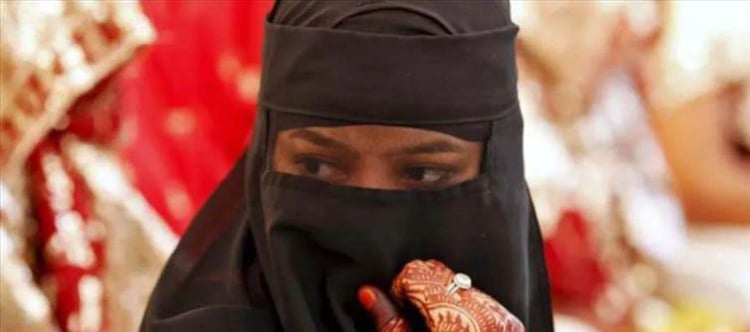
Islam takes divorce very seriously, however in certain cases, "Nikah Halala" becomes a contentious and extremely demeaning ritual for women.
Is Halala a violation of women's rights or an Islamic tradition?
To remarry her first husband, have sex with him, and then file for divorce, a woman must first marry another man, a procedure known as halala. Only a few segments of the Sunni Muslim population engage in this practice.
The Halala Process and Its Objective
Islamic law states that a woman cannot remarry her former husband unless she marries another man, engages in sexual contact with him, and then is divorced if a man divorces her three times (talaq-e-talas). This procedure is known as "Nikah Halala". Halala is meant to make divorce painful and definitive so that people do not take marriage lightly, according to Islamic thinkers. However, is this a truly noble practice for women?
Effects on Women: Sexual Abuse and Forced Halala
Numerous instances of women being exploited under the pretense of Halala have been exposed. women are frequently coerced into participating in Halala, which results in their sexual exploitation.
Actual event:
Incident in Uttar Pradesh: A woman from Rae bareli has claimed that she was abused physically and psychologically by her husband after he had her do Halala twice after delivering her triple talaq.
Online Halala Rackets: Clerics willing to perform Halala for cash have been caught in several online rackets in delhi and Mumbai. This topic has been covered in great detail by the BBC and other news outlets.
Social media event that went viral: There have been recent allegations of halal-related violence in bangladesh and pakistan when women were coerced by their relatives to have halala.
Halala: A bad tradition or a religious requirement?
In many Islamic nations, the halala custom is viewed as unfair. In Saudi Arabia, the United Arab Emirates, and many other Islamic nations, customs such as halala are discouraged. Muslim women have spoken out against it and called for its outlawing even in India.
Legal viewpoint: India's halala situation
Even if triple talaq was outlawed in india in 2019, nikah halala is still valid. However, several groups advocating for Muslim women's rights have called for its prohibition. On this matter, the supreme court is now considering many petitions.
The opinions of women on halala
Victims' voices: Several women have voiced their opposition to halala and referred to it as an exploitative practice.
Women's organizations' opposition: Its repeal has been called for by the Bharatiya Muslim Mahila Andolan (BMMA) and other groups.
Religious organizations' silence: The exploitation that occurs behind halala must end, even though many religious authorities consider it to be an integral part of Islam.
Halala is a very contentious practice that is seen as incompatible with women's rights and dignity. Such customs must be reexamined in the present day, and decisive action must be taken to defend women's rights.
Is Halala a violation of women's rights or an Islamic tradition?
To remarry her first husband, have sex with him, and then file for divorce, a woman must first marry another man, a procedure known as halala. Only a few segments of the Sunni Muslim population engage in this practice.
The Halala Process and Its Objective
Islamic law states that a woman cannot remarry her former husband unless she marries another man, engages in sexual contact with him, and then is divorced if a man divorces her three times (talaq-e-talas). This procedure is known as "Nikah Halala". Halala is meant to make divorce painful and definitive so that people do not take marriage lightly, according to Islamic thinkers. However, is this a truly noble practice for women?
Effects on Women: Sexual Abuse and Forced Halala
Numerous instances of women being exploited under the pretense of Halala have been exposed. women are frequently coerced into participating in Halala, which results in their sexual exploitation.
Actual event:
Incident in Uttar Pradesh: A woman from Rae bareli has claimed that she was abused physically and psychologically by her husband after he had her do Halala twice after delivering her triple talaq.
Online Halala Rackets: Clerics willing to perform Halala for cash have been caught in several online rackets in delhi and Mumbai. This topic has been covered in great detail by the BBC and other news outlets.
Social media event that went viral: There have been recent allegations of halal-related violence in bangladesh and pakistan when women were coerced by their relatives to have halala.
Halala: A bad tradition or a religious requirement?
In many Islamic nations, the halala custom is viewed as unfair. In Saudi Arabia, the United Arab Emirates, and many other Islamic nations, customs such as halala are discouraged. Muslim women have spoken out against it and called for its outlawing even in India.
Legal viewpoint: India's halala situation
Even if triple talaq was outlawed in india in 2019, nikah halala is still valid. However, several groups advocating for Muslim women's rights have called for its prohibition. On this matter, the supreme court is now considering many petitions.
The opinions of women on halala
Victims' voices: Several women have voiced their opposition to halala and referred to it as an exploitative practice.
Women's organizations' opposition: Its repeal has been called for by the Bharatiya Muslim Mahila Andolan (BMMA) and other groups.
Religious organizations' silence: The exploitation that occurs behind halala must end, even though many religious authorities consider it to be an integral part of Islam.
Halala is a very contentious practice that is seen as incompatible with women's rights and dignity. Such customs must be reexamined in the present day, and decisive action must be taken to defend women's rights.




 click and follow Indiaherald WhatsApp channel
click and follow Indiaherald WhatsApp channel